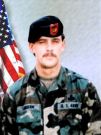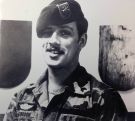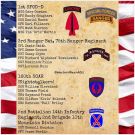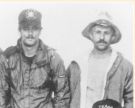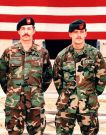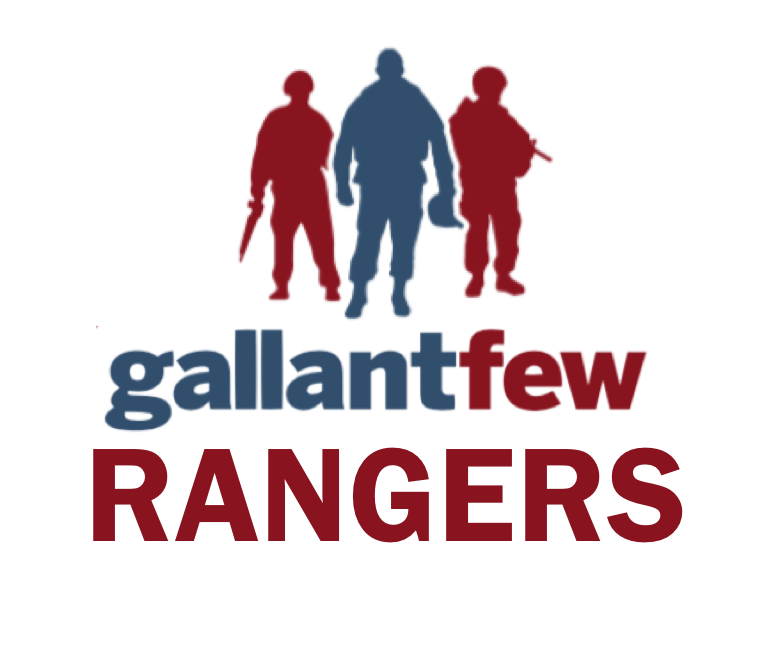Master Sergeant Gordon continued to travel the perimeter, protecting the downed crew. After his team member was fatally wounded and his own rifle ammunition exhausted, Master Sergeant Gordon returned to the wreckage, recovering a rifle with the last five rounds of ammunition and gave it to the pilot with the words, "good luck."
Then, armed only with his pistol, Master Sergeant Gordon continued to fight until he was fatally wounded. His actions saved the pilot's life. Master Sergeant Gordon's extraordinary heroism and devotion to duty were in keeping with the highest standards of military service and reflect great credit upon him, his unit and the United States Army.
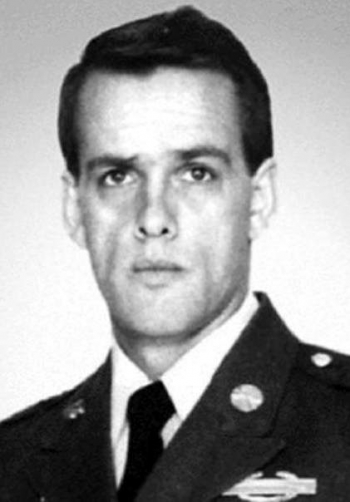 MSG Gary I. Gordon
MSG Gary I. Gordon from Lincoln, Maine
MSG Gordon served with: 1st Special Forces Operational Detachment-Delta
Born in 1960, Ranger Gordon was 33 years old at the time of his death in 1993.
Complete biography is below the photo gallery
MSG Gary I. Gordon 's Biography
Master Sergeant Gordon continued to travel the perimeter, protecting the downed crew. After his team member was fatally wounded and his own rifle ammunition exhausted, Master Sergeant Gordon returned to the wreckage, recovering a rifle with the last five rounds of ammunition and gave it to the pilot with the words, "good luck."
Then, armed only with his pistol, Master Sergeant Gordon continued to fight until he was fatally wounded. His actions saved the pilot's life. Master Sergeant Gordon's extraordinary heroism and devotion to duty were in keeping with the highest standards of military service and reflect great credit upon him, his unit and the United States Army.
During his military service, MSG Gary I. Gordon also served in 1st Special Forces Operational Detachment-Delta
Master Sergeant Gary I. Gordon - Medal of Honor Citation
http://www.history.army.mil/moh/somalia.html
Place and Date: 3 October 1993, Mogadishu, Somalia
Citation: Master Sergeant Gordon, United States Army, distinguished himself by actions above and beyond the call of duty on 3 October 1993, while serving as Sniper Team Leader, United States Army Special Operations Command with Task Force Ranger in Mogadishu, Somalia.
Master Sergeant Gordon's sniper team provided precision fires from the lead helicopter during an assault and at two helicopter crash sites, while subjected to intense automatic weapons and rocket propelled grenade fires. When Master Sergeant Gordon learned that ground forces were not immediately available to secure the second crash site, he and another sniper unhesitatingly volunteered to be inserted to protect the four critically wounded personnel, despite being well aware of the growing number of enemy personnel closing in on the site.
After his third request to be inserted, Master Sergeant Gordon received permission to perform his volunteer mission. When debris and enemy ground fires at the site caused them to abort the first attempt, Master Sergeant Gordon was inserted one hundred meters south of the crash site. Equipped with only his sniper rifle and a pistol, Master Sergeant Gordon and his fellow sniper, while under intense small arms fire from the enemy, fought their way through a dense maze of shanties and shacks to reach the critically injured crew members. Master Sergeant Gordon immediately pulled the pilot and the other crew members from the aircraft, establishing a perimeter which placed him and his fellow sniper in the most vulnerable position.
Master Sergeant Gordon used his long range rifle and side arm to kill an undetermined number of attackers until he depleted his ammunition. Master Sergeant Gordon then went back to the wreckage, recovering some of the crew's weapons and ammunition. Despite the fact that he was critically low on ammunition, he provided some of it to the dazed pilot and then radioed for help.
Master Sergeant Gordon continued to travel the perimeter, protecting the downed crew. After his team member was fatally wounded and his own rifle ammunition exhausted, Master Sergeant Gordon returned to the wreckage, recovering a rifle with the last five rounds of ammunition and gave it to the pilot with the words, "good luck."
Then, armed only with his pistol, Master Sergeant Gordon continued to fight until he was fatally wounded. His actions saved the pilot's life. Master Sergeant Gordon's extraordinary heroism and devotion to duty were in keeping with the highest standards of military service and reflect great credit upon him, his unit and the United States Army.
===
Gary Gordon, A Hero Who Died In The Heat Of Somalia
SCOTT S. SMITH
http://www.investors.com/news/management/leaders-and-success/gary-gordon-trained-as-delta-force-sniper/
Gary Gordon wouldn’t give up while aiming to rescue fellow soldiers trapped in Somalia in 1993.
The Army master sergeant’s third request to commanders was approved — with this warning:
You’ll likely die in the attempt.
Undaunted, Gordon and Randy Shughart — a fellow Delta Force sniper — went into the Mogadishu maze with guns blazing and took down a slew of terrorists.
And nearly pulled it off alive.
“Gordon was the epitome of the dependable individual who so believes in taking responsibility that he gives his life to protect his fellow men,” Fred Borch, author of “For Military Merit: Recipients of the Purple Heart,” told IBD. “He and Shughart were posthumously awarded the Medal of Honor, the first Americans to receive our highest military decoration since the Vietnam War.”
Remembrance
Gordon and Shugart are among the Americans honored on Memorial Day, which remembers those who died serving in the military.
Gordon (1960-93) was born in Lincoln, Maine, a mill town of 5,000 nestled in the northern forests. His teachers thought he was smart, but his grades drifted because he was obsessed doodling “anything and everything military-related,” his mother told a reporter. Not a surprise, since the Vietnam War was on TV every night.
He joined the Boy Scouts and played football in high school, graduating in 1978. He and his future wife, Carmen, met when she was visiting her grandparents, and they engaged in a three-year correspondence after he joined the Army.
After their wedding came a son, Ian, then a daughter, Brittany.
Gary and Carmen talked about opening a furniture store, but also candidly discussed what would happen if he died.
Gordon rarely talked about the details of his military career. He initially served with the 2nd Battalion of the 10th Special Forces, then became a sniper for the 1st Special Forces Operational Detachment-Delta, better known as Delta Force — an elite Army anti-terror unit.
Into Central America
In 1989, Gordon was with the outfit in Operation Just Cause, the invasion of Panama to capture its dictator, Manuel Noriega.
Two years later, the government of Somalia was overthrown and a civil war erupted. One result was disruption of the African country’s agriculture, resulting in 300,000 people dying of starvation. In 1992, a cease-fire opened the way for the United Nations to deliver food, protected by a coalition that included U.S. troops.
Much of the food was hijacked by Mohamed Aidid’s militia, and suddenly hundreds of thousands more Somalians were at risk of dying.
The U.S. Army aimed to prevent that, with Gordon’s Delta outfit landing in Mogadishu in the summer of 1993.
After Aidid’s forces killed 24 Pakistani soldiers that were part of the United Nations, the U.N. Security Council called for the militia leaders to be arrested or killed.
On Oct. 3, Gordon was the sniper team leader during Operation Gothic Serpent, an American operation that targeted Aidid’s key advisers in the slums of Mogadishu. The showdown pitted 160 special operations soldiers — arriving in 19 helicopters and 12 vehicles — against 3,000 Aidid men.
During the assault, one of the Army’s Black Hawk helicopters was shot down by a rocket-propelled grenade. Nearby operational command sent a ground team with chopper support to rescue the men, but it made slow progress in heavy fighting with Aidid’s militia.
Then a second Black Hawk was shot down, and militia members and an armed mob converged on the site. Gordon and two sergeant first class subordinates, Shughart and Brad Hallings, had been providing fire cover from another helicopter, but they knew this wasn’t enough if the crew of the second downed chopper was to be saved.
Facing The Fire
The only way to rescue survivors was for the Gordon-Shughart-Hallings copter to go in. When superiors reluctantly approved the mission, Gordon grinned and gave a thumbs up, but Hallings had to stay behind to man the minigun because its operator was wounded.
“This was an example of direct, honest communication and extremely high trust between a team leader and higher command,” said Clayton Chun, author of “Gothic Serpent” and chairman of the Department of Distance Education at the U.S. Army War College in Carlisle, Pa. “The snipers’ training, adaptive thinking, values and commander’s confidence in them allowed them to unequivocally accept the very high risk and take action.”
Gordon’s lesson is that when something is crucial, push hard.
A smoke grenade gave Gordon and Shughart some cover as they fought their way 100 yards through a shantytown to the downed craft.
Overhead, other Army helicopters came under fire from RPGs and had to withdraw.
Michael Durant, the pilot of the second downed chopper, wrote in “In the Company of Heroes”: “To me, they were like Batman and Robin, only much better, and they just walked up to my aircraft like they were out for a stroll in the park. They acted as if they were in no particular rush, and they raised me up gently and carried me to an open spot on the ground to the right of the cockpit and set me down carefully in the dust. Without a doubt, they saved my life.”
Chun said, “One removed the three other severely injured crew members, while the other provided covering fire and then they quickly assessed their situation. They set up a defense perimeter and gave Durant a rifle to protect their rear, since he was the only one in condition to help them. They realized that reinforcements would most likely not arrive in time, but fought on against overwhelming odds, exhibiting selfless service and personal courage.”
Suddenly Durant heard Gordon say, “Damn. I’m hit.”
The pilot wrote: “He sounded almost irritated, like this was just going to make things harder for him. It wasn’t a scream or a plea, just a statement of fact, like someone who’d nicked himself with a vegetable knife. I never saw or heard from him again.”
When the site was overrun by the Somali militia, Durant was the only survivor and was held hostage for 11 days until he was released to the Red Cross. The bodies of 50 Somalis were later found surrounding the chopper.
Deadly Price
The Army task force did capture Aidid’s advisers, but at high cost. The Battle of Mogadishu resulted in 18 soldiers killed — five from Delta Force — and 73 wounded. The Somalis claimed 315 of their own died and 812 were wounded.
The Americans’ “overconfidence played a part in the problems during the raid,” wrote Chun. “Many believed that it would not last long and would encounter little opposition.”
The critical lesson is to never underestimate your enemy.
The U.N. declared an end to the mission in April 1994. Aidid was fatally wounded in a battle with a rival militia two years later.
On Oct. 14, 1993, in rain as the population of Lincoln stood by in honor, Gordon was buried in his uniform in a flag-filled cemetery.
Shughart (1958-93) was buried in Carlisle.
Carmen Gordon wrote a letter to their children and had it published to help others coping with similar loss: “Your father had two families. One was us and the other was his comrades. Once he committed to something, the way was clear. He chose to be a husband and father and never wavered in those roles. He chose the military and ‘I shall not fail those with whom I serve’ became his simple religion. When his other family needed him, he did not hesitate, as he would not have hesitated for us.”
On May 23, 1994, President Clinton awarded Gordon and Shughart the Medal of Honor, joining just 3,000 others in two centuries.
The award read in part: “Master Sergeant Gordon’s extraordinary heroism and devotion to duty … reflect great credit upon him, his unit and the United States Army.”
---
https://en.wikipedia.org/wiki/Gary_Gordon
---
Debts of Honor
By Douglas E. Kneeland;
Published: May 29, 1995
http://www.nytimes.com/1995/05/29/opinion/debts-of-honor.html
For much of the nation, it seems, Memorial Day has come to mean the unofficial start of summer, a holiday to spend at the beach or in the backyard. In small towns in this part of the country, however, people still feel deeply their obligations to the past. And there aren't many of us who don't willingly remember and honor our dead, whether they died in the service of their country or simply succumbed to illness or age.
I was about to describe the holiday as somber, and in an obvious way it is that. But there's also a certain joy in the sense of continuity and fulfillment that comes with pausing to pay tribute to those who have gone before.
Today, I'm thinking about someone in particular: Gary Gordon, a young man who left this town, his hometown (and mine), to join the Army in 1978, when he was 18 years old.
Lincoln is a pulp-and-paper mill town and shopping center of 5,500 tucked among the fir forests and spring-fed lakes of northern Penobscot County. Gary attended the local high school and was a running back on the football team. He wasn't in the starting line-up, but he always gave his best. He liked to draw and doodle and sometimes his teachers thought he did too much of it in class. His mother, Betty, says his favorite subjects for drawing were military -- guns and tanks and things. That could have been a hint of his later career path, but in the years of the Vietnam War a lot of young boys were attracted to the military.
Still, Gary's interest may have surpassed that of the others. He liked to read and regularly rode his bike to the library to borrow books. A while back a friend of Gary's was seeking some information on the Medal of Honor at the library and found what he was looking for in an Army Information Digest pamphlet published in 1962 on the shelf. Checking the card in the back, he discovered that the last person to take out the publication had been Gary Gordon, on Oct. 1, 1971.
On Oct. 3, 1993, 22 years and two days after he borrowed that pamphlet, Master Sgt. Gary Gordon of the Army's elite Delta Force died along with 17 other Americans in a battle in Mogadishu, Somalia. (Seventy-five soldiers were wounded.)
He and his partner, Sgt. 1st Class Randy Shughart of Newville, Pa., were lowered down from a helicopter in the midst of the battle and killed as they sought to rescue wounded members of the crew of another helicopter that had been shot down. The pilot of the downed craft, Chief Warrant Officer Michael Durant, survived (he was captured, but later released), and said not long after, "Without a doubt, I owe my life to these two men and their bravery."
In a ceremony at the White House on May 23d last year, President Clinton awarded Medals of Honor posthumously to Gary and Randy "for conspicuous gallantry and intrepidity at the risk of life above and beyond the call of duty." The medals were given to their widows, Carmen Gordon and Stephanie Shughart. Gary's children, Ian and Brittany, were there, as were his parents, Duane and Betty Gordon. These are the only Medals of Honor that have been awarded for acts of valor committed in the years since the Vietnam War.
Perhaps this is a good place to say something about the history of the medal. Established July 1862 by an act of Congress, it is our nation's highest military honor as well as the first to be given. Until that time, Americans hadn't thought much about rewarding their military forces, but as tales of heroism began to emerge from the battles of the Civil War, politicians in Washington responded to a growing public sentiment for recognition of outstanding heroism.
The first six were presented on March 25, 1863, to survivors of a Union Army raiding party that had slipped into Georgia in civilian clothes in April 1862 to sabotage the Confederate rail link between Atlanta and Chattanooga.
All told, there are slightly more than 3,400 Medals of Honor on the books for the 132-odd years of its history, about half of those given for heroism during the Civil War, a time when brutal hand-to-hand fighting was the rule rather than the exception. World War I produced 96 winners; World War II, 432; Korea, 131, and Vietnam, 238.
In one corner of Duane and Betty Gordon's living room, there's a small display of a flag that flew over the Army compound in Mogadishu, one of Gary's green berets and other mementos of his military career. A drawing he did a few months before he was sent to Somalia, in August 1993, has a prominent place on the wall. The precise detailing of men in battle with a helicopter hovering in the background lowering reinforcement troops on ropes sometimes makes his parents wonder whether Gary had a premonition of his fate.
"It would have been really weird if there'd only been two of them," said his mother, noting that the drawing shows three men coming down the ropes, not two as when Gary and Randy made the drop.
On Oct. 14, 1993, Gary Gordon was brought home to Lincoln. "I was overwhelmed when I came into town that night and saw the crowd downtown in the rain and the cold," Betty said. Her eyes moist, she added, "You raise a child and then suddenly you're sitting in a car alone . . ."
She said some people ask why Gary wasn't buried at Arlington National Cemetery, outside of Washington. She tells them: "He didn't want to be. He wanted to be brought home here."
So he came home to lie in the cemetery on West Broadway, not far from the center of town and the library where he borrowed books on battles and the Medal of Honor.
Douglas E. Kneeland was a reporter and editor at The New York Times for 22 years. This is adapted from his column in The Lincoln News, a weekly newspaper.
